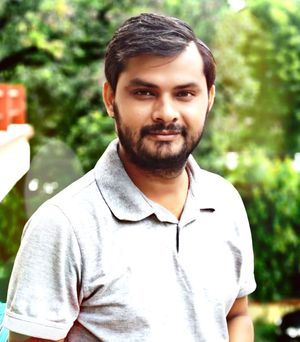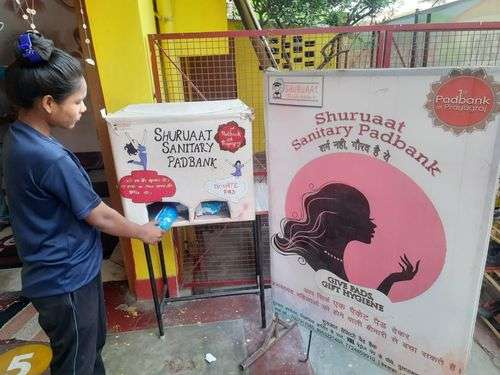Last Updated on April 25, 2023 by Shabnam Sengupta
We often hear that menstruation is something that should be a topic of discussion only among women. In a lot of cultures, women are advised to stay away from the men in the family as they are considered impure once their period starts. In a world where such notions still exist, there is a man hailing from Prayagraj, Avishek Shukla, whose progressive outlook towards menstrual hygiene and inclusive conversation is a breath of fresh air. Shukla established the first ‘sanitary pad bank’ in Prayagraj. In 2020, he completed his master’s degree in social work from Mahatma Gandhi Antarrashtriya Hindi Vishwa Vidyalaya, Wardha. At the time, he did not know what his journey of life would be.
Navigating the unknown

Describing where it all started, Shukla said, ‘I did not know how to start my journey, but as they say destiny takes you to the place that needs you. On September 16, 2016, I was passing by a railway crossing when I saw a little girl begging. At first, I didn’t pay much heed to it, but when I saw her continuously urging for help, I talked to her’. This little girl told Shukla that she did not have a mother and her father was an alcoholic. She also had a younger brother at home. To verify this information, Shukla went to her house. “I went to her house and found that she was telling the truth’, said he said.
The beginning of journey of compassion
After meeting this young girl, Shukla had a profound realisation. ‘I could not sleep properly, and my mind was consumed with the thoughts of her and finding solutions to the problems she and her family were facing’, he explained. Determined to take action, he co-founded “Shuruaat – Ek Jyoti Shiksha Ki” along with some friends on September 19 the same year. Their goal was to provide education to underprivileged children in Harinagar Basti, Prayagraj. Nevertheless, the journey was not without its challenges. Shukla explained that the local people did not show interest initially, having seen such initiatives come and go without any lasting impact. ‘It was difficult to convince people about the seriousness of the job’, he recounted.
Shukla and his team used to go door-to-door and discussed and emphasised the importance of education, as many parents in the area relied on their children for begging and earning money and provide financial support. However, he noted that changing people’s mindsets proved to be the greatest challenge. ‘Initially, no one was sending their children. We tried to motivate the kids by offering them gifts, but only a few responded. We were not satisfied with the progress’, he said. After numerous efforts, the number of kids gradually increased.
Overcoming financial hurdles

Shukla noted, ‘The members of our team include Shalini Yadav, Anjali, Anju, Anushri Ghosh, Shivani, Avanika, Varsha Tripathi, Rita Vishwakarma, Shreya, Sneha, Mahi, Nirdesh Dubey, Prakhar Srivastav, Kesavendra Singh, Arpit Jayaswal, Anshit Pathak, Pravar, Ayush Pandey, Nitish Sanjay, Anup, Amit Srivastav, Ravi, and Yaman Yadav’. He informed that initially, they used their own funds as they did not have any significant financial backing, but they were motivated by a strong desire to help children. Later they turned to various social media platforms to seek funding. However, Shukla said that some organisations claiming to be NGOs had damaged the reputation of social services, which had made people more hesitant to donate. As a result, they decided not to register their organisation as an NGO.
Currently, the organisation conducts classes near Ram Leela Park in Alopibagh, Prayagraj, where around 50 children from slums and footpath study from nursery to upper kindergarten. The teachers here take only a rupee per day from the kids as their education fee.
The hidden struggles of girls
The women members of the team noticed that the girl students were not coming to classes on certain days. When they spoke to them about it, they learnt that the girls could not allow to leave home during their menstrual periods. They also did not have the necessary means to maintain hygiene during this time.
‘I was extremely worried about this challenge, and on January 1, 2021, we founded the pad bank. This indeed works like a bank’, Shukla informed. This bank provides a passbook to all girls and women, who are in need of sanitary pads. In this passbook, details like when they took a pad, their name and address and other information are written down. Till date, around 900 have benefited from the pad bank. There are two branches of this bank in Prayagraj, and together, they maintain around 800 accounts. One branch is at Alopibagh which has 350 accounts and the other is at Shastrinagar Meerapur with 400 accounts. There is also a branch in Gopiganj in Vadohi with 100 accounts. ‘There is no special financial source for this at the moment. It is up to the people who voluntarily donate pads or money’, said Shukla.
Voices from the community

Women and girls who borrow pads from the bank said that they do not always have money to buy them. ‘One packet of pad costs around Rs 30 while we earn just around Rs 500-1,000 in a fortnight. It thus becomes very difficult for us to buy pads. But it has become much easier for us after the pad bank was opened. Now we don’t have to wear dirty and unhygienic clothes or stay back at home fearing period stains’, they said.
One woman, who donates pads to the bank, said on the condition of anonymity, ‘While menstruation is not considered a taboo as such in cities today, things have not changed much in villages. That’s why I donate some pads so that the girls’ health is not put in danger. Also, I feel satisfied thinking that I have done something good for them’.
‘There is still a long way to go, and I am just doing my work. There are many obstacles, but we have also taken a pledge to overcome them. We dream about a world where menstruating women will not have to go through pain. At the same time, we will also try to ensure that every child receives education and reaches his/her goal in life’, Shukla said.
Disclaimer: Medical Science is an ever evolving field. We strive to keep this page updated. In case you notice any discrepancy in the content, please inform us at [email protected]. You can futher read our Correction Policy here. Never disregard professional medical advice or delay seeking medical treatment because of something you have read on or accessed through this website or it's social media channels. Read our Full Disclaimer Here for further information.

